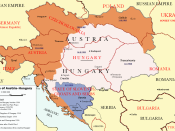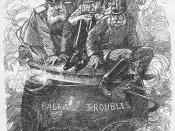History
Mr.Eric
September 8th, 2013
The third Balkan war turned European general war turned into a global war after the events preceding Austria's declaration of war on Serbia. It's valid to claim that Europe stumbled into a global war to the extent of the mismanagement of the events in 1914, but some countries such as Austria-Hungary could be thought of as aspiring and working towards a war.
One may state that the assassination of Archduke Franz Ferdinand instigated the start of the war. The 19 year old terrorist Princip had caused this linchpin, which eventually led to a world war. Austria-Hungary had used this assassination to fuel their desire to crush Serbia's pan-Slavic nationalism, which lead to Germany and Russian inclusion. The leader of the Serbian terrorist group was part of the government, which gave Austria-Hungary evidence to attack Serbia, due to the fact of the government being part of the assassination scheme.
One could state that while some Serbian officials were part of that affair, other Serbians just aspired for removal from the Austrian-Empire, who was encasing them, trying to remove their unity and nationalism.
The blank cheque sent to Austria-Hungary by Germany had instilled fear and suspicion of a larger war in the hearts of the European nations. The timing of the cheque, which was 5th July, 1914 was suspicious as Austria-Hungary's delay on the matter led to the belief of a larger-scope war. Austria-Hungary's deep desires for war were backed-up by Germany, which showed that Germany would have supported the war physically, even if not morally. One may state that Germany was only supporting their only firm ally due to their encirclement and domestic issues, others may argue that the blank cheque was a major instigator due to its timing for the war.
Due to Austria-Hungary's delay in sending the ultimatum, one has enough evidence to suggest that they were to attack Serbia no matter what their response to the ultimatum was. Austria-Hungary had sent the ultimatum weeks after the actual incident, which caused Serbian suspicion, as Austria-Hungary was preparing an ultimatum that was to be impossible to accept due to the sovereign acceptances of Serbia. Serbia was very complying with the ultimatum to the extent of Kaiser Wilhelm II stating that it was impossible to go to war with Serbia due to their accepting nature, but Austria-Hungary stated that it was too late to stop and had declared war on Serbia. One may state that because the iron dice were cast, it would have been impossible to stop the already instigated war, but this provides more evidence for the fact that Austria-Hungary aspired for a war.
The alliance between Germany and Austria-Hungary was thought of as suspicious due to the expansionist desires of Germany causing them to lose pride and respect, thus increasing the need for an important ally. Germany was greedy for territorial expansion, which led to the weltpolitik, and the Morrocan wars, which eventually led to the failure of the weltpolitik and much tension between Germany and Britain. One could state that Germany was supporting their only firm ally in the case of the blank cheque, and this strengthened alliance, while arguments could be made on the unnecessary aggressiveness of Austria-Hungary against Serbia with the support of Germany.
The short term causes such as the Balkan wars have increased the need for war, which eventually made the war more likely. The Balkan wars were within the empire itself, Austria-Hungary had not intervened in the first war due to the Russian-Serbian support, and they didn't intervene in the 2nd Balkan war because Germany urged them to stay out of the internal matter. That could be thought of as Germany trying to maintain the war internally without external support out of the Austrian-Empire, which shows that Austria-Hungary were containing themselves due to their German alliance. But the Balkan wars still increased the need to crush Serbian nationalism due to their victorious state, which shows one that Austria-Hungary was power-hungry and was not considerate of other European countries.
One may state that it was not only the events preceding the war that caused it, but also the long term causes that built up hatred between countries. Nationalism was very heavy in the Balkan regions, which caused fear between countries, in this case, Austria-Hungary and Serbia. The 3rd Balkan war had turned into a global epidemic with the help of the increased nationalism that had built up over the past decade. Imperialism had caused fear within European countries due to the need for colonisation. Imperialism affected all European countries in negative ways throughout the years from the Scramble of Africa to the need for Austria-Hungary's desire to contain Serbian Nationalism. One could state that the long term causes influenced the start of the war due to the built up tension and made the war more likely.
Thus, concluding from all given evidence, the war was instigated due to prolonged causes that made the war more likely, short term causes which made the war seem larger in scope and more possible, and the trigger of the Archduke's assassination which caused the whole anarchy. So one may agree that it is valid to claim that Europe stumbled into the war in 1914 only to the extent of the mismanagement of the July Crisis, but Austria-Hungary may be arguable as a major cause for the start of the war given all evidence.


